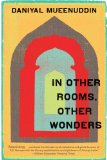Summary | Excerpt | Reading Guide | Reviews | Beyond the Book | Readalikes | Genres & Themes | Author Bio

But the next morning, when the servants were eating their parathas and tea, he came over and sat down next to her, saying nothing, sipping the tea and chewing noisily because of his false teeth, his mouth rotating. So everyone knew. After that he ate his meals next to her, and when they had no duties went off into the empty back garden and sat talking. But they didn’t make love, or even do more than hold hands.
At the end of the week Harouni and his retinue drove back to Lahore, Rafik, Saleema, and the rest.
The servants had a game that they played, with Rafik surprisingly enough not just acquiescent but the ringleader. Up in Rafik’s native mountains marijuana grew everywhere, along the sides of the roads, and thickest along the banks of open sewers running through the rocky pine woods below the villages, the blooming plants at the end of summer competing in sweetness and stench with the odor of sewage. Hash smoke clouded the late-night air in the little village tea stall when he was a young man. Now, every spring Rafik planted a handful of seeds behind some trees in a corner of the Lahore garden, and in the fall he dried the plants and ground up the leaves. He played tricks on the others, making a paste called bhang and slipping it into the food of one or another servant. Sometimes they would taste it and stop eating, but often not.
A few weeks after the visit to the Harouni farm at Dunyapur, Rafik began secretly compounding a batch of his potion in his quarters, with the help of Saleema. Kamila Bibi had gone back to New York, but Saleema had been kept on, through Rafik’s intervention. The accounts manager Shah Sahib had been planning to tell the master that the girl was “corrupt” and a “bad character”—saying these words in English—and toss her out. But now he held his tongue, not wanting to cross Rafik. And Rafik spoke for her one evening as the old man went to sleep, with Rafik massaging his legs.
“I beg your pardon, sir, about the maid Saleema who has been serving Begum Kamila. She’s a poor girl and her husband is sick and she’s useful in the kitchen. She makes the chapattis. If you can give her a place it would be a blessing.”
The old man did not merely lack interest in the affairs of the servants—he was not conscious that they had lives outside his purview.
“That’s fine.”
Now Saleema watched in Rafik’s quarters as he boiled the dried leaves in water over an electric ring.
“Hey, girl, close the door, don’t let anyone see.”
She sat down on the edge of the bed, swinging her bare feet, kicking off her sandals, which fell by the door. Rafik squatted, stirring the leaves with a wooden spoon and peering into the cauldron. They still hadn’t made love, though now he would lie with her in the afternoon during the servants’ naptime, his hand on her breasts. He made no attempt to hide their relations, and all the servants thought they must be sleeping together. She would fold him into her body, and stroke his thinning hennaed hair while he slept.
“This is a strange kind of cooking for an old man.”
“You’re the strange one, following this old man around like a little sheep. Most shepherds are young boys.”
“Please don’t say that.” She never in her life had spoken in these gentle tones.
He looked up at her, eyes smiling, pointing with the spoon. “Be careful or I’ll give you a taste of this!”
“No thanks.”
“No, I’m serious. When Mian Sahib goes to ’Pindi I want everyone to take some. I’ll have it too.”
“Are you kidding?”
“It’ll be fun. And we’ll be together. You can trust me.”
Excerpted from In Other Rooms, Other Wonders by Daniyal Mueenuddin. © 2009 by Daniyal Mueenuddin. Excerpted by permission of W.W.Norton & Company. All rights reserved. No part of this excerpt may be reproduced or reprinted without permission in writing from the publisher.
There are two kinds of people in the world: those who divide the world into two kinds of people, and those who don'...
Click Here to find out who said this, as well as discovering other famous literary quotes!
Your guide toexceptional books
BookBrowse seeks out and recommends the best in contemporary fiction and nonfiction—books that not only engage and entertain but also deepen our understanding of ourselves and the world around us.